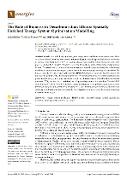The Role of Biomass in Decarbonisation Efforts: Spatially Enriched Energy System Optimisation Modelling

Datum vydání
2023Publikováno v
EnergiesRočník / Číslo vydání
16 (21)ISBN / ISSN
ISSN: 1996-1073ISBN / ISSN
eISSN: 1996-1073Metadata
Zobrazit celý záznamTato publikace má vydavatelskou verzi s DOI 10.3390/en16217380
Abstrakt
Forests are a potentially carbon-negative energy source and function as carbon sinks. However, both of these functions have become threatened significantly by spruce bark beetle infestation in Czechia. This paper assesses how this ecological issue may affect the future energy mix, and in the process, affect carbon emission reduction targets and the available share of renewable energy sources (RESs). We assess several forest development scenarios with three policy incentives: subsidising wood pellet production, striving for climate neutrality, and adhering to ecological constraints. We build a spatially enriched energy system model, TIMES-CZ, based on Eurostat's NUTS3 regions. We find that the spruce bark beetle infestation may not exert a lasting influence on overall decarbonisation pathways, the energy mix, or system-wide costs in any forest scenario. The RESs share is affected only until 2030, and the effect is minimal, at <1.5 percentage points. Nevertheless, Czechia's RES contribution is far below the 45% 2030 EU target. Subsidising wood pellet production is a costly transition that does not contribute to meeting the target. Limiting forest biomass availability and adhering to ecological constraints increase the overall system costs and worsen the chances of meeting decarbonisation targets.
Klíčová slova
energy system modelling, TIMES model, biomass energy, spatial granularity, decarbonisation, spruce bark beetle infestation,
Trvalý odkaz
https://hdl.handle.net/20.500.14178/2478Licence
Licence pro užití plného textu výsledku: Creative Commons Uveďte původ 4.0 International






